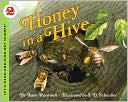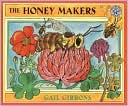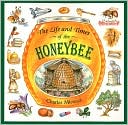To honor the US's 212,000 beekeepers and 2.41 million colonies of honeybees, which produce more than 200 million pounds of honey each year, we celebrate National Honey Month from September 1-30.
-The Teacher's Calendar, 2008-2009
While many teachers don't teach units on honeybees until the spring, September makes as good a time as any... and if you'd rather wait until spring, that's cool too, just keep these wonderful books in mind!
-The Teacher's Calendar, 2008-2009
While many teachers don't teach units on honeybees until the spring, September makes as good a time as any... and if you'd rather wait until spring, that's cool too, just keep these wonderful books in mind!
 Rockwell, Anne.
Rockwell, Anne. Honey in a Hive.
2005.
HarperCollins Publishers.
Guided Reading Level: Q
Summary from Barnes & Noble:
In spring and summer, honeybees gather nectar to make into honey. These fascinating insects live and work together in complicated societies, complete with queen bees and workers. Read and find out about honeybees and their creation -- honey!
This is a very information book told in the form of a story - children are clearly learning a great deal from all that is contained in this book, but it won't feel to them as though it's actually "learning." They will likely be mesmerized by these interesting details and many more!
- worker bees make about 400 long flights before they fall to the ground and dies of exhaustion
- learning the dance of the worker bee to alert others of a field of nectar
- the ultraviolet markings on flowers that lead honeybees to nectar
- only one queen resides in each hive
 Gibbons, Gail.
Gibbons, Gail.The Honey Makers.
1997.
Morrow Junior Books.
Guided Reading Level: O
Summary from Barnes & Noble:
How sweet it is. Thousands of bees visited more than one million flowers to gather the nectar that went into that one-pound jar of honey. Here's the buzz on how these remarkable insects work together to create this amazing food.
What I absolutely love about Gail Gibbons books is how informative they are! This one will not disappoint. It is chuck-full of scientific terms that are so important when teaching about honey and honeybees... One of my favorite parts of this book were the last two pages - A Beekeeper's Yearbook, which depicts the different stages of honeybees and honey making throughout the course of a year. However, there's so much to be learned on every spectrum of the honeybee... the dances, the anatomy, the beehives, the honey... there truly is something that will appeal to everyone when using this book!
 Micucci, Charles.
Micucci, Charles.The Life and Times of the Honeybee.
1995.
Ticknor & Fields Books for Young Readers.
Summary from Barnes & Noble:
This witty and informative salute to the honeybee uses clear, lively text and detailed full-color illustrations to present a wide range of interesting, and sometimes amusing, facts about the life cycle, work, and history of one of the world's most useful insects.
This is another wonderful resource when teaching children about honeybees and honey making! Like The Honey Makers, this is loaded with important, useful information. It is a bit more detailed, so you will have to take that into consideration when using this with children, as there may be a need to modify what's being used, depending on the child(ren) and their level. Definitely worth including in a unit though!
Lesson Plans/Learning Activities:
- Honey Bee Lapbook
- Honeybee Lesson Plan
- News for You: Honeybees are Vanishing
- The Honeybee and the Robber
- Have children create a yearbook entry of their own... assign 2 students to each month of the year. Ask one to write as though they are the Queen Bee and the other to write as if they were one of the worker bees. This will require a bit of research on their part in order to determine what are some key points in each month of year in regards to the honeybee.








0 comments:
Post a Comment